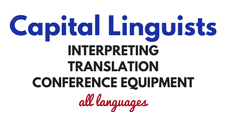Growing an enterprise is no walk in the park. Especially when your organization gets to a certain size. Whether you’re expanding your business globally or just setting up a more cost-efficient means of production, you’re highly likely to find yourself needing to speak with people from other countries.
Now, luckily, you speak English. And so does most of the world. But that only goes so far. To establish firm, stable and long-term relationships with wpients, contacts and suppliers abroad, you’re going to need – at one point or another – the use of one or more translation companies. Maybe you use us as your translation agency, maybe you don’t. But whatever you do, don’t attempt to communicate with foreign business contacts with Google Translate and a loud voice and then expect success. You’re going to need professional interpreting services.
Let’s work with an example. Say you’re launching a new product worldwide. You’ve had the marketing collateral written up by your Marketing department. It’s perfect. You’ve had some great sales domestically. You want to roll out that same campaign across the planet and really see some game-changing sales for your firm. But, obviously, you’ll need the language altered. So you get it all literally translated, word for word. Perhaps by a professional translation services company, or maybe by yourself. Now you sit back and wait for the Yen to roll in…
Except it never does. Why not? You know you have an amazing product. And a marketing approach with a proven track record. So what went wrong? Well, you didn’t tailor your approach. Cultural differences may have scuppered you. Or, just maybe, a mistranslation threw a monkey wrench in the works.
Okay. Stop a second. Let’s just think about that phrase quickly. ‘To throw a monkey wrench in the works’. You know what it means. We know what it means. But in the UK and Australia? It’s to throw a spanner in the works. Sure, a Brit or Aussie would understand ‘monkey wrench in the works’, but it’d sound funny to them. It wouldn’t chime with them, it wouldn’t resonate. It would jar.
Now imagine that phrase has made its way into your Korean marketing translation. Or your Chinese marketing translation. The phrase doesn’t exist in that form in either country. You’re translating marketing material dreadfully here. Why? Well, the concept of an incident of plain sailing going awry now sounds meaningless. In fact, it’s worse than meaningless. It’s confusing. Without hiring a Mandarin interpreter to help translate, the customer in Asia is probably left wondering why you’re suddenly talking about throwing tools at primates.
There’s a history and precedent for enormous mistranslations between Asian languages and English. The most extreme and catastrophic example being America’s translation of the word ‘Mokusatsu’ during WWII.
It was July 1945. The tail end of the biggest global conflict ever. The USA were at war with Japan. On top of the fight, America demanded surrender from the Japanese, dewparing that without full and immediate surrender, Japan could expect ‘prompt and utter destruction’.
The Japanese Prime Minister Kantaro Suzuki was in the process of making a decision when he was asked by reporters what he was going to say to the Americans. He simply avoided answering by uttering one word: ‘Mokusatsu’. The Japanese translation of the word ‘silence’. In this context though, it means ‘no comment’. He didn’t want to answer the question.
But in avoiding a direct reply, Suzuki may well have set off a chain of events leading up to the Hiroshima bombings. Only ‘mokusatsu’ can also be taken as ‘I’m ignoring it’ or even ‘I have silent contempt for that’. Taken out of context and not explained to the Americans fully by their Japanese interpreter, it was seen as a grave insult. And one which was to prove extremely costly to so many people.
Now, you’ll never make a mistake when translating for sales and marketing as big as that. That kind of goes without saying. But sometimes you have to use a sledgehammer to crack a nut when you’re explaining something to someone, don’t you?
What? You’ve never heard that expression before?! Alright, well, we’ll translate it for you… Occasionally hyperbole outlines a concept better than a literal explanation.
Now we’re on the same page!
Marketing Translation
Recent Posts
English to Chinese translation and how it can help your business
June 29, 2024
No Comments
Countries Where People Speak Spanish
June 20, 2024
No Comments
Top Rated Translation Agency in Los Angeles
June 6, 2024
No Comments
Top 5 Italian Translation and Interpreting Service Providers
May 20, 2024
No Comments
Top 10 Russian Translation Services in the USA
May 3, 2024
No Comments
